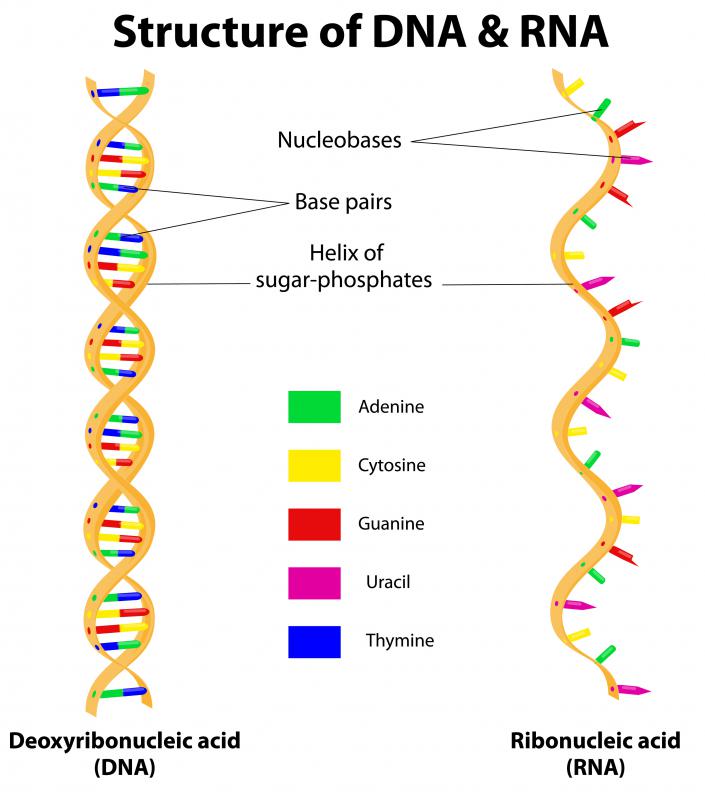At WiseGEEK, we're committed to delivering accurate, trustworthy information. Our expert-authored content is rigorously fact-checked and sourced from credible authorities. Discover how we uphold the highest standards in providing you with reliable knowledge.
What is a Gene Mutation?
A gene mutation is a change in an organism's genetic material. Gene mutations can occur for a variety of reasons, and have a range of effects, from benign to malignant. Benign mutations in genetic material explain why people look very different, for example, while cancer is caused by malignant genetic mutations. Using genetic testing, doctors and researchers can identify individual points in an organism's DNA where a gene mutation has occurred, and learn more about the process of mutations.
Hereditary or germline mutations occur when eggs or sperm develop mutations which are passed on to the baby. These mutations often occur because of errors in the generation of eggs and sperm, although they can also be errors which have been passed down over generations. If a gene mutation occurs after fertilization, as might occur when some of the rapidly dividing cells in a developing fetus mutate, it is a new or de novo mutation. Both types of mutation can lead to congenital disabilities, or they may be so minimal that they are not evident.

People can also acquire gene mutations during their lifetimes, in response to random errors in cell division, environmental pressures, or exposure to substances which interact with DNA. These types of acquired mutations tend to cause mosaicism, in which a gene mutation is only present in some of an organism's cells, rather than in the whole body. Cancer is a classic example of an acquired gene mutation.

Researchers can also use genetic engineering to deliberately create a mutant gene. Scientists sometimes induce genetic mutations in the lab in order to study how mutations occur and what effects they have on the body, and they can also introduce beneficial mutations, such as resistance to crop pests in commonly grown crops. Creating genetic variance for research purposes can be very useful, as researchers can take a generation of similar animals and alter their DNA to see a full spectrum of presentations of a mutation, from mild to severe.

Natural variance in a population is a sign of good health. Variations in genetic material ensure that organisms are robust, and suggests that a large pool of interbreeding organisms is perpetuating the species. Along the way, both harmful and beneficial mutations can emerge, contributing slowly over time to the continued evolution of a species or the emergence of an entirely new species. Researchers have used some stable mutations to track the evolutionary history of organisms of interest.
AS FEATURED ON:
AS FEATURED ON:














Discussion Comments
Do all genetic mutations cause diseases and are all diseases caused by genetic mutations?
Both of my parents are good in math and science and work in fields related to those subjects; from an early age most of my teachers told me I would excel in the arts rather than math and science and I felt the same way. Can I say that is due to a genetic mutation?
@Renegade
This is a good question, and it has become clear that diversity seems to be related to mutations in human gene haplogroups. The human genome project has mapped both maternal and paternal haplogroup trends to note mutations in patterns throughout the world. It is still quite ambiguous, however, concerning how these different mutations contribute to "diversity," and which facets of an individual they affect.
This causes me to wonder what kind of benign gene mutations resulted in the diversity of global genetics. Did people really "mutate" to become different or are there just certain trends in certain regions?
Hemophilia is a gene mutation which is prevalent in the British Royal Family. It is dangerous because it can cause any minor bleeding to become severe due to excessive blood clots in the veins.
Post your comments